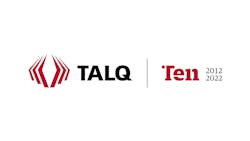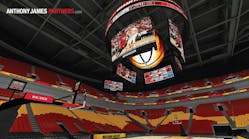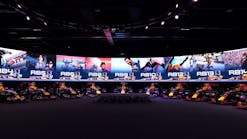Piscataway, NJ, USA– May 18, 2022 – The TALQ Consortium, which has developed the Smart City Protocol, a global OpenAPI interface standard for smart city device networks, is celebrating its 10th anniversary on 23rd June 2022 at the DOLL Living Lab in Copenhagen, Denmark. Founded in 2012, originally with the scope of defining a standard protocol for outdoor lighting, the consortium has evolved to become the ideal framework for achieving compatibility between smart city applications. The main goal has remained the same: to ease and protect investment decisions of cities and utilities.
In the past five to ten years, smart outdoor lighting has become one of the main targets for public investment in cities, not least because of the huge potential for energy-saving costs and the wish to reduce their CO2 footprint. This is why seven street lighting companies agreed to found an industry consortium with the scope of defining a common protocol standard back in 2012. Since then, the TALQ Consortium has developed a standard interface enabling interoperability between street lighting communication networks in the field and the software platforms managing applications over these networks. The goal has always been – and continues to be – to support cities and municipalities on their way to becoming smart cities by protecting them from vendor-lock-in and, in turn, accelerating adoption of energy- and cost-saving systems.
Becoming the global standard
In 2017 the decision was taken to extend the software protocol for use between Central Management Systems and generic Outdoor Devices Networks, beyond street lighting, to enable compatibility between systems from different verticals. The proven TALQ Framework has presented the perfect backbone to foster interoperability between various smart city applications, such as lighting, parking, traffic control, environmental services and waste management.
On June 23, 2022, the consortium will host an event with several smart city experts at the DOLL Living Lab in Copenhagen, Denmark, to explain and highlight the benefits of employing the TALQ protocol. This will be an ideal opportunity to network, find out what is going on in the industry and understand TALQ’s place in the ecosystem. “We are really proud of our joint efforts and the very fruitful collaboration over the past ten years. More than 50 member companies, nearly 20 TALQ partners and more than 40 TALQ-certified products speak for themselves.” summarizes Simon Dunkley, Secretary General of the TALQ Consortium. “It continues to be a great experience to see how industrial cooperation between likeminded organizations can help to reduce public spending, increase sustainability and create open solutions.”
TALQ will continue to review and update its standard. This continuous enrichment and evolution of the protocol ensures that future-oriented aspects of smart city services will be incorporated. The current TALQ Specification is 2.4.0; meanwhile a version 2.5.0 is already under development to be released later in 2022.
About the TALQ Consortium:
Founded in 2012, the TALQ Consortium has established a globally accepted standard for management software interfaces to control and monitor heterogeneous smart city applications. The TALQ Smart City Protocol is a specification for information exchange, suitable for implementation in various products and systems. This way interoperability between Central Management Software (CMS) and Outdoor Device Networks (ODN) from different vendors will be enabled, such that a single CMS can control different ODNs in different parts of a city or region.
TALQ is an open industry consortium currently consisting of about 50 member companies.
For more information visit talq-consortium.org
About DOLL Living Lab:
DOLL is Europe’s leading living lab for intelligent lighting and Smart City-services, building bridges between manufacturers, public decision makers and knowledge institutions with a common interest in developing liveable, sustainable and resource efficient communities through the means of technology.
Addressing the needs of the emerging smart and connected cities, DOLL Living Lab is set out to create an innovative playground and transparency in the new complex markets by offering demonstration and test of the latest solutions in intelligent outdoor lighting and Smart City-services.
DOLL Living Lab is anchored in WE BUILD DENMARK, the Danish national cluster for the building and construction sector.
For more information visit doll-livinglab.com
Certified TALQ-Compliant Products (TALQ Version 2):
Central Management Software (CMS):
• CityLinx from BeeZeeLinx, France
• City Vision from Capelon, Sweden
• IBOR from CGI, the Netherlands
• Light Control CMS from Datek, Norway
• StreetMan from Dhyan, USA
• inteliLIGHT CMS from Flashnet, Romania
• SLV CMS from Itron, USA
• SmartLinx from LED Roadway Lighting, Canada
• LuxSave Streetlight CMS from LuxSave, Sweden
• PE Smart CMS Neptune from Paradox Engineering, Switzerland
• LightingGale from Quantela, USA
• EXEDRA from Schréder, Belgium
• CityMESH CMS from SICOM, Chile
• PLANet Telensa from Signify, The Netherlands
• CityManager from TVILIGHT, the Netherlands
• Smart Firefly from Uvax, Spain
• WeLight Manager from Wellness TechGroup, Spain
Outdoor Device Network (ODN) / Gateway:
• Citybox from Bouygues, France
• Flashnet IoT platform from Flashnet, Romania
• SELC Gateway from Itron, USA
• SLV Gateway from Itron, USA
• SmartNodes solution from LACROIX City, Belgium
• Tegis from LACROIX City, France
• Ki from Lucy Zodion, United Kingdom
• LuxSave Streetlight GW form LuxSave, Sweden
• Mayflower CMS incorporating TALQ Gateway from Mayflower, United Kingdom
• WixLi Portal GW from NEXIODE, France
• PE Smart GW from Paradox Engineering, Switzerland
• NearSky from Quantela, USA
• Requea Gateway from REQUEA, France
• DIMmy-web from Revetec, Italy
• EXEDRA from Schréder, Belgium
• Owlet IoT from Schréder, Belgium
• CITY GATEWAY from SICOM, Chile
• Interact City from Signify, the Netherlands
• AGIL IoT Platform from ST Electronics (Info-Comm Systems), Singapore
• T-Light Gateway from ST Engineering Telematics Wireless, Israel
• Trilliant TALQ Gateway from Trilliant, Canada
• LwM2M TALQ Gateway from Urban Control, United Kingdom
• CA-13 from Uvax, Spain
• Witti TALQ Gateway from Witti, France
Contact:
Eva Jubitz
TALQ Communications Consultant





